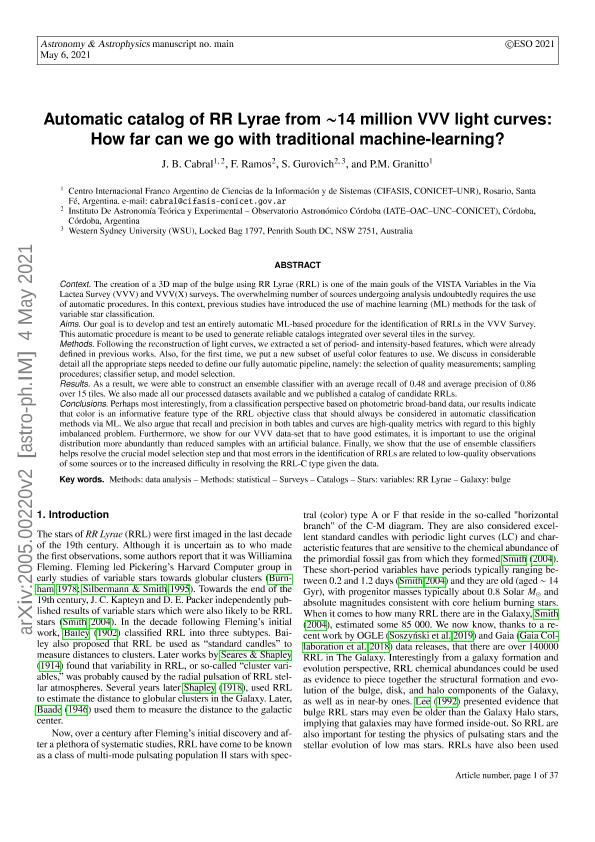Mostrar el registro sencillo del ítem
dc.contributor.author
Cabral, Juan Bautista

dc.contributor.author
Ramos Almendares, Felipe Alberto

dc.contributor.author
Gurovich, Sebastian

dc.contributor.author
Granitto, Pablo Miguel

dc.date.available
2021-10-07T17:57:00Z
dc.date.issued
2020-10
dc.identifier.citation
Cabral, Juan Bautista; Ramos Almendares, Felipe Alberto; Gurovich, Sebastian; Granitto, Pablo Miguel; Automatic catalog of RR Lyrae from ∼14 million VVV light curves: How far can we go with traditional machine-learning?; EDP Sciences; Astronomy and Astrophysics; 642; 10-2020; 1-38
dc.identifier.issn
0004-6361
dc.identifier.uri
http://hdl.handle.net/11336/143182
dc.description.abstract
Context. The creation of a 3D map of the bulge using RR Lyrae (RRL) is one of the main goals of the VISTA Variables in the Via Lactea Survey (VVV) and VVV(X) surveys. The overwhelming number of sources undergoing analysis undoubtedly requires the use of automatic procedures. In this context, previous studies have introduced the use of machine learning (ML) methods for the task of variable star classification. Aims. Our goal is to develop and test an entirely automatic ML-based procedure for the identification of RRLs in the VVV Survey. This automatic procedure is meant to be used to generate reliable catalogs integrated over several tiles in the survey. Methods. Following the reconstruction of light curves, we extracted a set of period- and intensity-based features, which were already defined in previous works. Also, for the first time, we put a new subset of useful color features to use. We discuss in considerable detail all the appropriate steps needed to define our fully automatic pipeline, namely: the selection of quality measurements; sampling procedures; classifier setup, and model selection. Results. As a result, we were able to construct an ensemble classifier with an average recall of 0.48 and average precision of 0.86 over 15 tiles. We also made all our processed datasets available and we published a catalog of candidate RRLs. Conclusions. Perhaps most interestingly, from a classification perspective based on photometric broad-band data, our results indicate that color is an informative feature type of the RRL objective class that should always be considered in automatic classification methods via ML. We also argue that recall and precision in both tables and curves are high-quality metrics with regard to this highly imbalanced problem. Furthermore, we show for our VVV data-set that to have good estimates, it is important to use the original distribution more abundantly than reduced samples with an artificial balance. Finally, we show that the use of ensemble classifiers helps resolve the crucial model selection step and that most errors in the identification of RRLs are related to low-quality observations of some sources or to the increased difficulty in resolving the RRL-C type given the data.
dc.format
application/pdf
dc.language.iso
eng
dc.publisher
EDP Sciences

dc.rights
info:eu-repo/semantics/openAccess
dc.rights.uri
https://creativecommons.org/licenses/by/2.5/ar/
dc.subject
CATALOGS
dc.subject
GALAXY: BULGE
dc.subject
METHODS: DATA ANALYSIS
dc.subject
METHODS: STATISTICAL
dc.subject
STARS: VARIABLES: RR LYRAE
dc.subject
SURVEYS
dc.subject.classification
Astronomía

dc.subject.classification
Ciencias Físicas

dc.subject.classification
CIENCIAS NATURALES Y EXACTAS

dc.title
Automatic catalog of RR Lyrae from ∼14 million VVV light curves: How far can we go with traditional machine-learning?
dc.type
info:eu-repo/semantics/article
dc.type
info:ar-repo/semantics/artículo
dc.type
info:eu-repo/semantics/publishedVersion
dc.date.updated
2021-08-19T19:59:22Z
dc.journal.volume
642
dc.journal.pagination
1-38
dc.journal.pais
Francia

dc.journal.ciudad
París
dc.description.fil
Fil: Cabral, Juan Bautista. Consejo Nacional de Investigaciones Científicas y Técnicas. Centro Científico Tecnológico Conicet - Rosario. Centro Internacional Franco Argentino de Ciencias de la Información y de Sistemas. Universidad Nacional de Rosario. Centro Internacional Franco Argentino de Ciencias de la Información y de Sistemas; Argentina
dc.description.fil
Fil: Ramos Almendares, Felipe Alberto. Consejo Nacional de Investigaciones Científicas y Técnicas. Centro Científico Tecnológico Conicet - Córdoba. Instituto de Astronomía Teórica y Experimental. Universidad Nacional de Córdoba. Observatorio Astronómico de Córdoba. Instituto de Astronomía Teórica y Experimental; Argentina
dc.description.fil
Fil: Gurovich, Sebastian. Consejo Nacional de Investigaciones Científicas y Técnicas. Centro Científico Tecnológico Conicet - Córdoba. Instituto de Astronomía Teórica y Experimental. Universidad Nacional de Córdoba. Observatorio Astronómico de Córdoba. Instituto de Astronomía Teórica y Experimental; Argentina
dc.description.fil
Fil: Granitto, Pablo Miguel. University of Western Sydney; Australia
dc.journal.title
Astronomy and Astrophysics

dc.relation.alternativeid
info:eu-repo/semantics/altIdentifier/url/https://www.aanda.org/10.1051/0004-6361/202038314
dc.relation.alternativeid
info:eu-repo/semantics/altIdentifier/doi/https://doi.org/10.1051/0004-6361/202038314
dc.relation.alternativeid
info:eu-repo/semantics/altIdentifier/url/https://arxiv.org/abs/2005.00220
Archivos asociados
